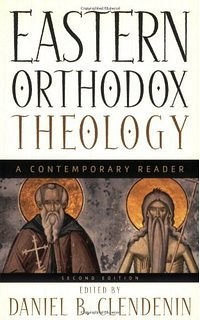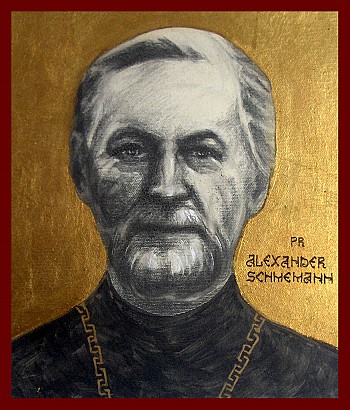Dear Parish Faithful,
For the upcoming Fall Adult Education Class (six sessions from Monday, October 19 - Monday, November 23) I have chosen the following book, Eastern Orthodox Theology - A Contemporary Reader.
This book is a collection of essays from some of the most prominent Orthodox thinkers and theologians of the 20th c. It is their unique theological contributions that have shaped the over-all theological, ecclesiological and liturgical vision of the OCA throughout some of its most formative years. We will read essays by Frs. Florovsky, Meyendorff and Schmemann, and also from V. Lossky and possibly a few others.
Please avail yourself of the following link for purchasing access to this book: Eastern Orthodox Theology - A Contemporary Reader.
As of September 18, we still have four copies in our parish bookstore.
It could prove to be interesting!
-- Fr. Steven
Download and print the flier for our Fall Adult Class. Copies also available at the church.
Dear Parish Faithful,
Attached is the flier announcing our upcoming Fall Adult Education Class that will begin two weeks from this evening, on Monday, October 19, at 7:30 p.m.
For those who plan on attending, we will discuss the essay, "The Meaning and Content of the Icon," by Leonid Ouspensky, at our first session. This essay is a "classic" as it brilliantly brings out all of the glory and depth "hidden in plain view" in the icon. I would further recommend reading as much as possible in Part I of the book, especially Archbishop Kallistos Ware's essay, "The Earthly Heaven," about the Liturgy. That will provide the setting for Ouspensky's essay on the icon. Two copies of the book remain in our parish bookstore.
The tentative schedule for the other five sessions is as follows:
Session II - "Doing Theology in an Eastern Orthodox Perspective" by Fr. John Meyendorff
Session III - "The Function of Tradition in the Ancient Church" and "The Authority of the Ancient Councils and the Tradition of the Fathers" by Fr. G. Florovsky.
Session IV - "The Procession of the Holy Spirit in Orthodox Trinitarian Theology" by Vladimir Lossky
Session V - "The Missionary Imperative in the Orthodox Tradition" and "Moment of Truth for Orthodoxy" by Fr. Alexander Schmemann
Session VI - undecided for the moment.
The essays that we will read and discuss together have been chosen because they were so instrumental in shaping the theological vision of the leaders of the Orthodox Church in America. These seminal works were also instrumental in the 20th c. revival of Orthodox theology.
I would like to make an appeal to those of you who rarely or never participate in our parish (adult) education program, one of the three "pillars" of parish life. Please give this class some consideration if circumstances render your presence a real possibility. You do not have to commit to all of the six sessions, of course. Anyone and everyone is encouraged to attend any given session whenever possible.
Fr. Steven
Scroll down for link to order the book, and for our event flier in PDF format.

Dear Class Participants,
On Monday, we will discuss the second of Fr. Florovsky's brilliant articles on the Church Councils and the Fathers of the Church. Please read that article carefully. I would highly suggest also reading Lossky's article on "Tradition and Traditions" if you have the time. I may also make a few comments about Lossky's further article on the filioque - which is rough going, but rewarding!
Looking forward to our next session.
Fr. Steven
Dear Class Participants,
I am sending ahead of time an outline that we will use to highlight the main points of Fr. Florovsky's (brilliant!) article on the Councils and the Fathers. I have included under the different subsections what I believe were passages that helped to summarize and "capture" the over-all content of each section. You may have chosen others, so please feel free to share those with the group.
I have also added a few questions that will hopefully lead to a lively discussion that will take us beyond the confines of the article into our present-day situation. Please feel free to bring up questions of your own for group discussion.
Fr. Steven
The Authority of the Ancient Councils and the Tradition of the Fathers
Dear Class Participants,
Here is an outline with questions based on the first of Fr. Schmemann's articles that we will discuss. I hope to get a second outline out by the weekend or Monday. Either way, please read his second article also.
Fr. Steven
Notes on 'The Missionary Imperatve', by Fr. Alexander Schmemann
The Missionary Imperative
In the Orthodox Tradition
Fr. Alexander Schmemann
Obstacles to Understanding the Orthodox Approach to Missions
“It must be kept in mind that the Orthodox Church has never been challenged by an ecclesiological or doctrinal crisis comparable to the Reformation or Counter-Reformation.” (p. 196)
“Therefore, in the ecumenical encounter, the Orthodox Church had to face a Christian world with several centuries of autonomous theological and spiritual development behind it, with a mind and thought forms radically different than those of the East.” (p. 197)
“The Orthodox answers were classified according to Western patterns, reduced to categories familiar to the West, but hardly adequate to Orthodoxy.” (p. 197)
Orthodox Doctrine and Experience of the Church
As Heaven on earth” … One can rightly describe the church as an eschatological reality, for its essential function is to manifest and to actualize in this world the eschaton, the ultimate reality of salvation and redemption. In and through the church, the kingdom of God is made already present, is communicated to men.” (p. 197)
“The church as a whole is a means of grace, the sacrament of the kingdom … “ (p. 198)
“The first aspect of the church as response is God-centered … “ (p. 198)
“The second aspect of the church as response is man – or world-centered.” (p. 199)
“The eschatological nature of the church is not the negation of the world, but, on the contrary, its affirmation and acceptance as the object of divine love.” (p. 199)
“The church thus is not a self-centered community but precisely a missionary community of salvation not from, but of, the world.” (p. 199)
The Missionary Imperative
“The last and the crucial segment of the history of salvation” is “the proclamation and the communication of the eschaton, which is already the being of the church and indeed its only being.” (p. 199)
“There are two complementary movements in the Eucharistic rite: the movement of ascension and the movement of return.” (p. 200)
“The Eucharist is always the end, the sacrament of the Parousia; and yet it is always the beginning, the starting point: now the mission begins.” (p. 200)
“The Eucharist, transforming the church into what it is, transforms it into mission.” (p. 200)
The Object of Mission
The objects and goals of mission “are man and the world.” (p. 200)
“The church, the sacrament of Christ, is not a religious society of converts, an organization to satisfy the religious needs of man. It is the new life and redeems therefore the whole life, the total being of man.” (p. 200)
“The kingdom is yet to come and the church is not of this world. And yet this kingdom to come is already present and the church is fulfilled in this world.” (p. 201)
“In the world of incarnation nothing neutral remains, nothing can be taken away from the Son of man.” (p. 201)
Potential Questions
Why is mission so integral to the Gospel?
What does Fr. Schmemann mean by the “eschatological” aspect of the Church? How is this realized and experienced in the Eucharist?
How does the Liturgy and Eucharist lead to mission?
How have we, as Orthodox, tried to restore this eschatological and Eucharistic dimension of the Church in our parishes today?




